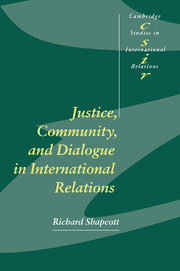Book contents
- Frontmatter
- Contents
- Acknowledgements
- Introduction
- 1 Beyond the cosmopolitan/communitarian divide
- 2 Community and communication in interpretive theories of international relations
- 3 Emancipation and legislation: the boundaries of conversation in poststructuralism and the critical theory of IR
- 4 Philosophical hermeneutics: understanding, practical reasoning and human solidarity
- 5 Philosophical hermeneutics and its critics
- 6 Towards a thin cosmopolitanism
- Conclusion
- Bibliography
- Index
- CAMBRIDGE STUDIES IN INTERNATIONAL RELATIONS
3 - Emancipation and legislation: the boundaries of conversation in poststructuralism and the critical theory of IR
Published online by Cambridge University Press: 22 September 2009
- Frontmatter
- Contents
- Acknowledgements
- Introduction
- 1 Beyond the cosmopolitan/communitarian divide
- 2 Community and communication in interpretive theories of international relations
- 3 Emancipation and legislation: the boundaries of conversation in poststructuralism and the critical theory of IR
- 4 Philosophical hermeneutics: understanding, practical reasoning and human solidarity
- 5 Philosophical hermeneutics and its critics
- 6 Towards a thin cosmopolitanism
- Conclusion
- Bibliography
- Index
- CAMBRIDGE STUDIES IN INTERNATIONAL RELATIONS
Summary
In the previous chapter it was argued that both critical theorists and poststructuralist writers in IR shared the goal of a non-exclusionary and communicative relationship to difference. A reading of the works of Linklater, Ashley and Walker, and Connolly suggested that communication, as an act of recognition which did justice to difference, was a common element of both. In addition, it was also suggested that poststructuralism (in at least one variant) and critical theory came to focus on the issue of communication as a consequence of a commitment to the possibilities for human freedom. However, it was also suggested that Linklater's appropriation of Habermasian discourse ethics provided the most sophisticated treatment of the nature of communication and conversation in IR. Because it is premised on the principle of universal consent, discourse ethics provides a more just relation to difference through the formula of an unconstrained dialogue. This allows a more just orientation towards difference because no agent, no matter what their particular cultural starting point might be, is to be excluded from dialogue in advance: conversation is exemplified in the principle of equality in dialogue without requiring (uniform) identity. Stemming from this principle, Linklater argued that discourse ethics recognises the need for a universal and unconstrained dialogue in order to pursue consensus and agreement on questions of justice and inclusion. The task left to discourse ethics was the setting out of the nature of procedures necessary to ensure such communication.
- Type
- Chapter
- Information
- Justice, Community and Dialogue in International Relations , pp. 95 - 129Publisher: Cambridge University PressPrint publication year: 2001

